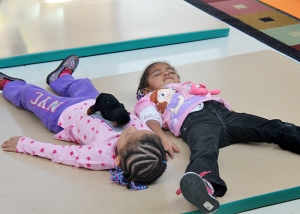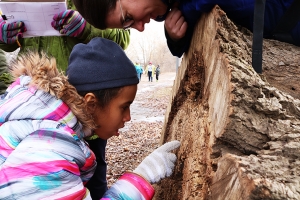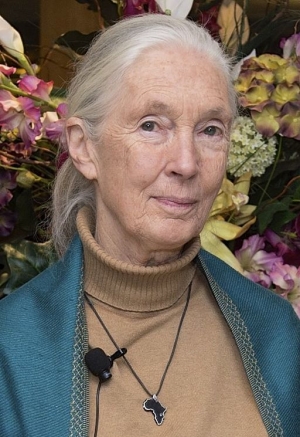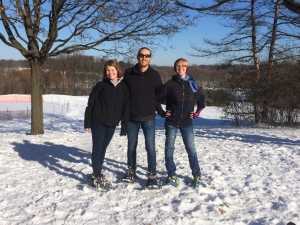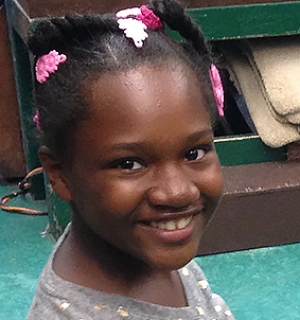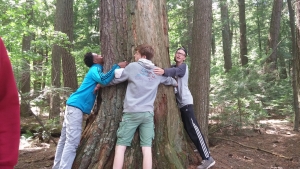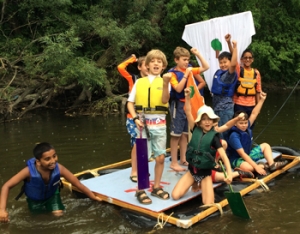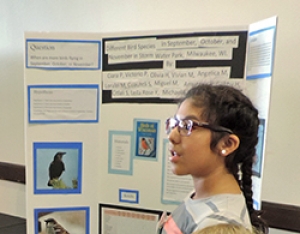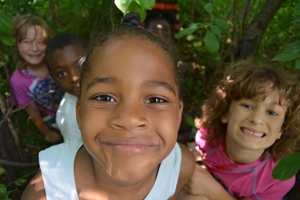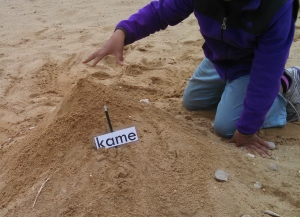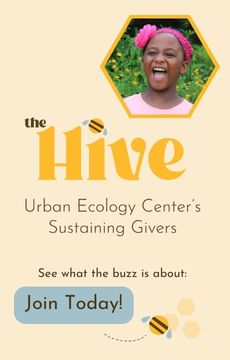
Mindfulness, Curiosity’s Best Friend
At first, it might seem as if the concepts of curiosity and focus are at odds with each other. After all, isn’t curiosity — which we all wish to inspire in kids — a wondering mind that finds the unknown thrilling and riveting? To a certain extent, yes. However, a child’s curiosity is much more: it is a pull to uncover the truths of the natural and the man-made world. As such, it requires time, patience and focus, from both the kids and the teachers.
Digging into Curiosity
It was one of those freakishly warm days in February when the temperatures rose into the low 70s. I was working with a group of excited, but respectful, 2nd graders from Franklin Pierce Elementary. We were focusing on one of the most important of nature’s resources, soil. Inside we learned how the FBI (fungus, bacteria, and invertebrates) change sticks, leaves and other organic material into soil. Then we headed outside for some exploring.
We made our way in the warm sun to a multitude of dirt piles we use for adding soil to our park. Each student was given a spade as their scientific instrument. Soon the students were digging in the dirt more enthusiastically than a dog digging for a bone, looking for those FBI. It did not matter that they were not finding anything right away. Just having this tool in their hands was enough for them. Soon though we made our first find, ancient rocks (gravel) that we decided could be a meteorite! There’s nothing like a little imagination to spark the curiosity of young scientists. Suddenly one of the students yelled, “I got a worm! I got a worm!” With mud-coated hands the student proudly showed his find.
All the students flocked to the spot quicker than crows mobbing an owl. They all couldn’t wait to dig in that exact same spot. I explained that there are many worms out there and if we all dug in the same spot someone was going to end up with a face full of dirt. We continued our digging in different spots. Worm after worm, meteorite after meteorite, we kept exploring. Their excitement could not be contained.
The students dug and dug all morning long until we had to give up our spot to the other half of the class that was exploring the park. We could have spent all of our time there, no doubt.
As I listened to the stories of discoveries made, reflected on how all of this excitement came from just from digging in the soil. Just giving students the chance to dig and use a tool was enough for them to puzzle out what can be discovered in nature. How simple, how engaging, and how amazing nature is when you just get out there and play, as well as get a bit dirty!
The teacher could not have been more pleased with his students and all the things they discovered that day. I also learned something; it is not the fancy vocabulary students learn while here or the concepts we think children should know that builds a land ethic. It is the chance to explore without worry and to get their hands a bit dirty while connecting with our planet.
An International Impact
As we created Urban Ecology Center branches, we were barely thinking outside of the bounds of our neighborhoods. Our goals were all about “acting local” - protecting and enhancing Milwaukee’s natural areas and its surrounding waters. “Thinking global” was attainable, but “acting global” seemed a bit out of reach. The thought of our work having anything to do with places as far flung as Guatemala, Mexico, Israel, the Congo or Tanzania was not even possible to conceive of back in those earlier days.
Appreciating Winter - An Outdoor Leader's Story
The bitter cold of Milwaukee winters makes it difficult for many to stay active and have any interest in leaving the house to enjoy the outdoors.
Since I joined the Outdoor Leader program at the Urban Ecology Center this summer, I've come to understand that this place can make it possible to have fun outdoors in any weather. I have never considered myself to be a 'winter person,' often opting to stay cuddled up in a blanket on the couch once the temperature drops below 20 degrees.
What are Community Programs?
I am a relatively new Community Programs Educator at Washington Park. We do much more than I ever expected!
What do I do? Here are some examples.
Roughly a month ago we taught the principle of cause and effect to a group of five year olds from Fernwood Montessori School in Bay View. As they came into the building for their second visit three weeks later, many of them kept saying, “I remember you! We played tug of war and you lost!”
A Unique Summer Job
I have said many times before that the Outdoor Leader Program is by far the best first job I could have gotten. Unlike many other jobs, I was not given one-day training and thrown into my work; I was given several weeks to learn. All of the staff that volunteered to train, teach, and work with us were patient and did the best that they could to take care of us and our needs. In the weeks that I was given I created unbreakable bonds and friendships with my coworkers as well as experiences that I never would have gotten anywhere else.
You Feel Mighty Free and Easy and Comfortable on a Raft
Last summer the Urban Ecology Center held its first Engineering for Kids Summer Camp for third and fourth graders. The entire experience at this camp completely exceeded my expectations. The campers built a raft with their own hands out of recycled wood, inner tubes, ropes and milk jugs and on their last day of camp they embarked on a big adventure - gliding their raft down the Menomonee River.
I felt intimately connected to this project as it reminded me of my childhood. My friends and I used to build rafts with driftwood in the Alagón River Reservoir, Spain. It was a passion I could share with my campers.
From Students to Scientists: an "Impossible" Journey
Students can be scientists? It's true! In another story of "impossibles made possible" by your support of the Urban Ecology Center, we're taking at look at our Young Scientists Club and their participation in the University of Minnesota's Driven to Discover program!
See For Yourself - Summer Camps!
Spending time outdoors, actively engaging with nature is what our Summer Camps are all about!
Our campers explore the secrets of nature by looking under logs, hiking in the woods, climbing trees, building forts, creating art projects, taking pictures and more with kids from all over the city. They’re building science and engineering skills to be better prepared for school year.
Lake Michigan Lessons
One of my favorite places to take school groups is Lake Michigan. It is such a valuable resource right in the backyard of our city. We use it in many ways to teach lessons to students. One lesson is that our drinking water comes from Lake Michigan. Another is the rock cycle, during which we collect different rocks at the “skipping stone beach.” Recently, my co-teacher Tory and I used the beach to teach 4th graders about glaciers and glacial landforms.
Copyright © 2023 The Urban Ecology Center

